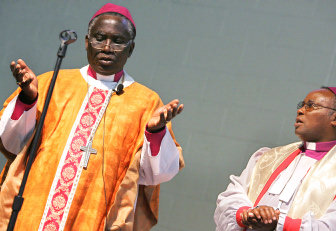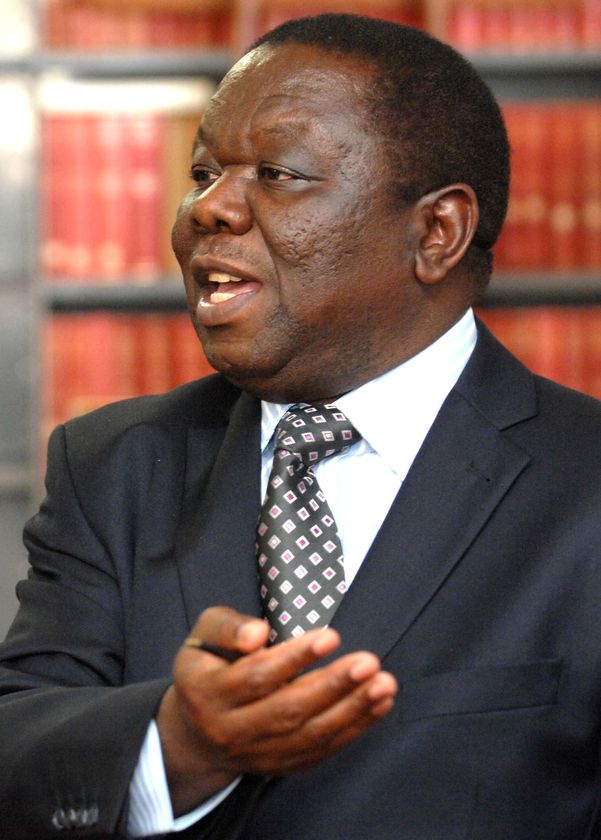 Queuing for food in Zimbabwe
Queuing for food in ZimbabweFrom Anglican Information
We have been asked to circulate the following Pastoral Letter from The Rt Rev’d Sebastian Bakare, Bishop of Harare, Zimbabwe.
Readers will recall that Bishop Bakare has the challenging task of leading the Anglican Diocese of Harare whilst the former bishop Nolbert Kunonga continues to harass church members, occupy the cathedral and prevent access to churches. It is hoped that Kunonga’s reign of terror will soon come to an end in the new political climate in Zimbabwe. Kunonga continues to be a strong supporter and political mouthpiece of President Robert Mugabe. Kunonga has enjoyed a very close working relationship with Bernard Malango the previous Archbishop of the Central African Province.
Apart from Zimbabwe, Kunonga is still causing problems in Botswana where he has stirred seven dissident priests to challenge in court the authority of their bishop the Rt Rev’d Trevor Mwamba. We carried the full background story on 12th & 15th November 2007 and it is available for reference on our website.
============================================
Website: http://www.dioceseofhararecpca.wordpress.com/
E-mail contact: avondaleparish.cpca@gmail.com
Church of the Province of Central Africa
The Diocese of Harare
From the Bishop of Harare
P.O. Box HR7331
Harare Pastoral Letter September 2008
Theme: God Our Refuge
Dear Sisters and Brothers,
I am still under shock as I write this Pastoral letter. A young mother and her son about 10 years old appeared at the doorstep of our flat recently asking for food. After more than 40 years as a priest I know the difference between a professional street beggar and a hungry person genuinely asking for food. She was no street beggar at all. Going by her appearance she had not seen water to bathe for a long time.
This young mother represents many others in our community today in Zimbabwe. As you all know, most people have been without running water in their homes for months, let alone, electricity, and there are no affordable food items in the shops. Cholera, a waterborne disease, has claimed several lives in Chitungwiza. Children are being sent home from schools because teachers like all workers are underpaid. One does not have to speak about unemployment any more, because the majority of our work force is at home as they cannot afford bus fare to work. Housebreaking and other criminal activities have increased. In short we have been messed up by a few men and women who have ravaged our economy through corruption and patronage.
As voters we have done our best but our participation in the elections has been fruitless. Good governance, justice and peace remain a pipe dream for is all in Zimbabwe. Selfish leadership has no room for the neighbour. Such kind of leadership should be reminded of the words of Job:"Naked I came from my mother's womb and naked I will depart".
In a situation like this the following prayer may be of help to you:
Jesus Christ, when scorn and shame besiege us and hope is veiled in
grief, hold us in your wounded hands and make your face shine on us again, for
you are our Lord and God. Amen.
We refer you to Ps.31 for further personal reflection.
Diocese of Rochester
As many of you know my wife and I were in the United Kingdom to attend Lambeth Conference. Whilst in the UK, we took the opportunity to re-establish our diocesan link with the Diocese of Rochester. It was a happy occasion to formalise our relationship.
Apart from visiting some parishes in that diocese and staying with host families, I had the opportunity to preach in the Rochester Cathedral under the leadership of the very able Dean and a very welcoming congregation. My wife and I were very much uplifted in fellowship with so many sisters and brothers in that cathedral. At the Eucharist the intercessor prayed for "Michael, the Bishop of Rochester, Brian, the Assistant Bishop, and Sebastian, the Bishop of Harare." This was one important way of demonstrating our new relationship. Likewise we are asking our intercessors to pray for "Sebastian our Bishop, Michael Bishop of Rochester and Brian, his assistant". For your information the full names of the two bishops are: Michael Nazir-Ali, Bishop of Rochester and Brian Castle, Bishop of Tonbridge (Tonbridge is part of Rochester Diocese).
The Diocese of Rochester has an established Link Committee, and we are in the process of forming one. The Link committees will work together in order to strengthen our relationship. We are going to ask you to submit profiles of your parishes so as to be linked with those in Rochester. We are glad to hear that the link between Tafara and Rainham in Rochester Diocese has continued despite the temporary suspension of the link. If there are some parishes which had links with Rochester before the suspension and would like to resume them, please let us know.
While we were in Rochester Diocese, Rainham church organised a special evening prayer for Zimbabwe with colour slides taken by Bishop Brian during his recent visit to Harare showing locked churches and open air services as well as empty supermarket shelves. It was a very touching service, especially to know the concerns expressed by our brothers and sisters in Rochester Diocese.
Lambeth Conference 2008
The Lambeth Conference is a gathering of bishops from the entire Anglican Communion which met for the first time in 1888. It meets every ten years to discuss issues of common concern in the mission of the church today. In the words of the Archbishop of Canterbury: "The chief aims of our time together are, first, that we become more confident in our Anglican identity, by deepening our awareness of how we are responsible to and for each other; and second, that we grow in energy and in enthusiasm for our task of leading the work of mission in our church."
The conference gives bishops a chance not only to get to know each other personally, but also to share stories from different parts of the world and the cultural contexts they come from. This year's conference was attended by 670 bishops out of approximately 800 bishops in the Anglican Communion. Nigeria, Rwanda and Uganda did not attend.
One of the issues that came up among others was homosexuality, especially the blessing of same sex marriages and ordination of openly gays and lesbians. Lambeth's position was that homosexuality is a sensitive pastoral and divisive issue that has to be handled with care. Lambeth discussed this issue in a very responsible manner by emphasising the importance of the family bond in the Communion whereby members of one family do not have to agree on all issues but still remain a family. Contrary to the forecast by the media that the Anglican Communion was about to break up, the 670- bishops present expressed their allegiance to the Archbishop of Canterbury and the Communion. It was also made clear and agreed upon, after long discussion in small groups where all the bishops were able to make an input, that the ordination of gays and lesbians and blessings of same sex marriages was to stop forthwith and the discussion about these matters was to continue.
You may have heard that several bishops met in Jerusalem prior to Lambeth expressing their unwillingness to participate at the Lambeth Conference over the issue of homosexuality. However a good number of those who met in Jerusalem also attended Lambeth to show their allegiance to Canterbury and the Anglican Communion. Even those who stayed away have not severed relationship with Canterbury.
There were many other areas of serious concern such as the political crises in Zimbabwe, Darfur and Pakistan. My wife and I were surprised and indeed moved to come across so many bishops and their spouses who were very much aware about the persecution in our diocese and assured us of their prayers. Archbishop Rowan Williams and his wife Jane personally pray for Zimbabwe daily in their chapel. They are indeed a gift to the Anglican Communion. We came home feeling very much encouraged by the solidarity we experienced at Lambeth.
We were also reminded of our responsibility in Zimbabwe to pray for other areas of conflict in the worldwide Communion. We rarely hear of such places mentioned in our intercessions. Once more we appeal to clergy to remind those who lead the prayers that the Anglican Church goes beyond our national boundaries and that we have a duty to pray for one another and especially for those in troubled areas of the world.
62nd Session of Synod
Synod was held on 29 and 30 August 2008. We want to thank you, especially those who had the opportunity to discuss the agenda before Synod in their congregations. This helped a great deal to make our deliberations at Synod more meaningful and also faster. A good number of resolutions were passed, and it is our sincere hope that they will be implemented. We do believe that your delegates have since reported back to you about the resolutions taken a Synod. We will be approaching some members to serve on various commissions to form the newly established Diocesan Council.
Chapter Appointments
We are pleased to announce the names of the new Chapter of the Cathedral of St Mary and All Saints:
Canon H. Chifunyise,
Canon T. Madeyi,
Canon D. Manyau,
Canon J. Mudowaya,
Canon F. Mutamiri (Dean),
Canon C. Tapera,
Canon W. Zhuwakino to be installed in the Cathedral in the near future.
Canons D. Nhema, M. Madziwanyika, M. Makoni, who are in active retirement
will serve as honorary canons of the Cathedral.
Ordination
God willing there will be ordination of the following candidates at Banket Church on 27 September 2008 at 9am:
Rev. Taurai Constantine Kachembere
Mr Alexander Mahlava
Mr. Naboth Manzungo
Mr. Boyman Mancama
M. Mahomed Selemani
Please pray for them and their families.
Political Agreement
The news of the deal between MDC and ZANUPF is most a most welcome development. We hope, however that the deal was motivated by and has the interests of the people at heart and that there is serious commitment to its implementation on all sides.
Your Bishop
Signed +Sebastian Harare
From
Anglican Information










%231%23.jpg)


 And God made Palin,
And God made Palin, 



















